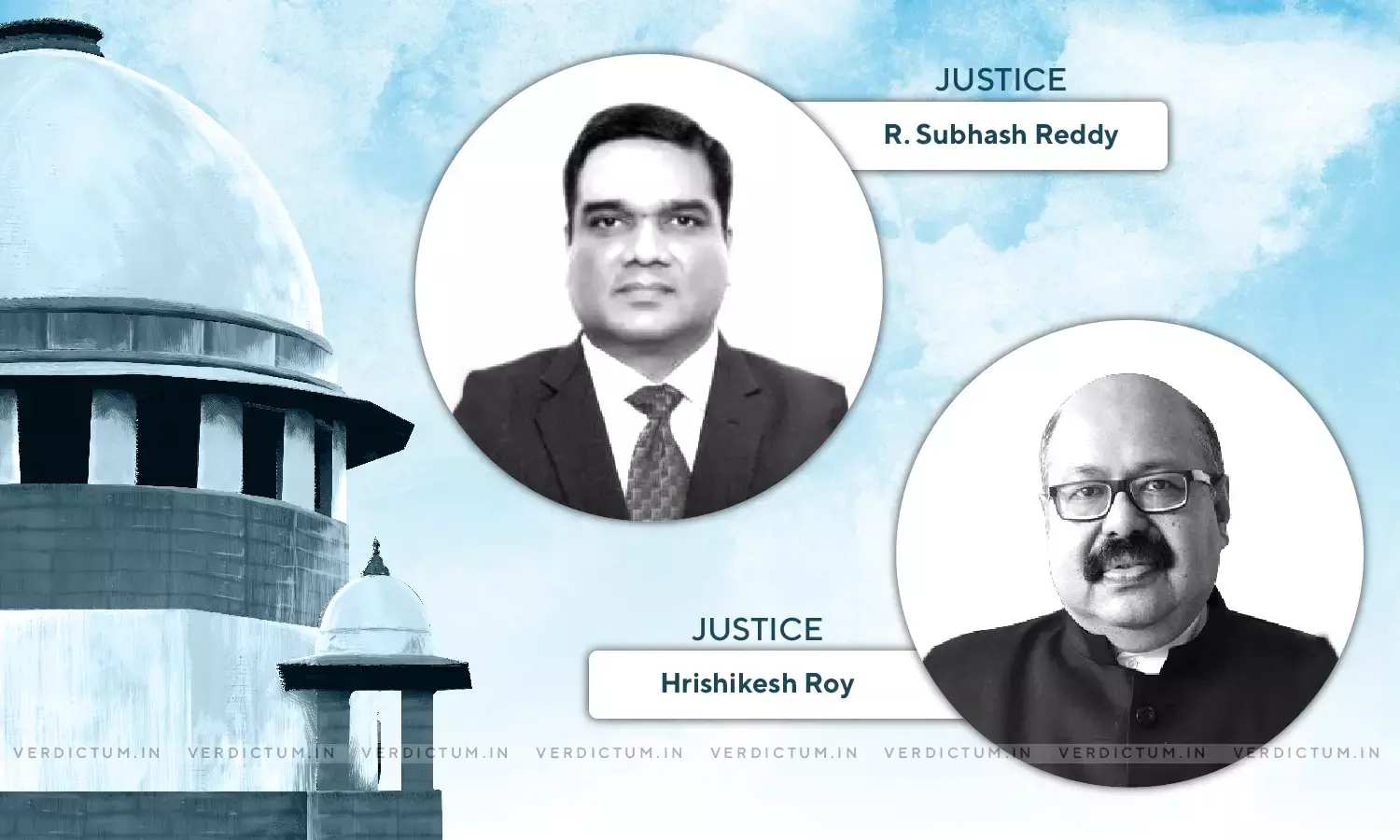Omission By RBI To Mention Enabling Provision Doesn't Change Nature And Status Of Direction, If RBI Has Requisite Authority: SC
A two-judge Bench of Justice R. Subhash Reddy and Justice Hrishikesh Roy has held that actions in furtherance of grounds of 'public policy' by the RBI were justified, for issuing the subject Notification and the omission by the RBI to mention any enabling provision, doesn't change the nature and status of the direction.
Mr. K.V. Viswanathan, Senior Advocate appeared on behalf of Small Industries Development Bank of India (SIDBI) while Mr. Sabyasachi Chaudhury, Senior Advocate advanced submissions on behalf of M/s. SIBCO Investment Pvt Ltd (SIBCO).
The Single Judge of Calcutta High Court had dismissed the suit of SIBCO [respondent before Apex Court]. In appeal, the Division Bench reversed the view of the Single Judge. Hence, the appeal before the Apex Court. The suit was filed against SIDBI [appellant before the Apex Court] to seek interest on alleged belated payment of principal sum and accrued interest to SIBCO for bonds issued by SIDBI.
SIDBI issued 41 bonds to an entity called CRB Capital. These bonds were sold by CRB Capital to Shankar Lal Saraf and those were then sold to SIBCO. CRB Capital faced winding-up proceedings.
The case of the SIBCO was that principal and interest were both paid beyond the maturity period and hence, SIDBI was liable to pay interest for delayed payment. SIBCO averred that SIDBI had unreasonably withheld the said amount while SIDBI claimed that because of the embargo and restrictions in place by RBI as also the pending proceedings, the maturity amount was not paid on the date of maturity.
The Court proceeded to examine the effect of RBI communication on the subject bonds and the statutory provisions that empower the RBI. The Court discussed Section 45-K of the RBI Act, 1934 which grants authority to RBI to collect information relating to NBFCs and give directions pertaining to deposits.
RBI, via its communication, had informed SIBCO about the winding up of CRB capital and prohibited SIDBI from parting with the interest on securities. However, according to the Court, the RBI did not mention any provision under which the said communication was issued. Hence, it was argued by SIBCO that this was an advice and not a statutorily enforceable directive.
The Court held that conjoint reading of the statutory provisions made it clear that for "public interest", RBI is empowered to issue directives to the banking institutions and to prohibit alienation of NBFC property.
The Court noted that it was not necessary for the RBI to mention a specific provision before issuing directives however the RBI requires authority under the law to issue such direction. The Court noted that RBI was not only vested with curative but also preventive powers.
The Court held that RBI had the requisite authority to issue the subject commission and the omission by RBI to mention any enabling provision doesn't change the nature and status of the direction. The Court held that RBI's notification was binding on SIDBI, it being a banking institution.
The Court however noted that the actual status of the Notification would have a bearing on the claim against SIDBI as SIBCO did not challenge the legality of the said Notification. The Court noted that relief can't be granted in the suit without determining the legality of the Notification.
On the question of bond status and obligation of SIDBI, the Court noted -
"Resultantly an obligation has been imposed on the transferee of the promissory notes, to be deemed to be a 'Holder in due course', that the notes should have been acquired in good faith; after exercising reasonable care and caution about the holder's title. In the present case, while the Shankar Lal Saraf's (holder) title over the Bonds/Promissory Notes is not in dispute but as discussed earlier, Shankar Lal Saraf's holding stood cleared by the Company Court only on 17.12.2004 but before the said judgment, there was a cloud over his title. Consequently, the plaintiff's status as 'holder in due course' was suspect at the relevant point of time."
On the issue concerning the entitlement of interest on delayed payment, the Court noted as follows:
"The actions of SIDBI were bona fides, in furtherance of RBI directives, which were issued in the public interest. In the case of Clariant International Ltd. Vs. SEBI, this court speaking through Justice S B Sinha held that two conditions need to be satisfied before awarding interest. First, that money should be wrongfully withheld from the rightful owners; Second, that there should be equitable considerations for awarding said interest. In the case at hand, neither of these conditions are found to be satisfied."
The Court also held that SIBCO's demand was barred by the principle of waiver/acquiescence. It was also held that the subsequent suit of SIBCO was barred by the principle of constructive Res Judicata.
The Court, in concluding remarks, observed -
"It is clear from the discussion above, that the RBI has wide supervisory powers over financial institutions like SIDBI, in furtherance of which, any direction issued by the RBI, deriving power from the RBI Act or the Banking Regulation Act is statutorily binding on the defendant. Admittedly, the RBI issued Notification dated 10.04.1997, deriving power from S. 45-MB(2) of the RBI Act. Thereby, the RBI froze the assets of CRB Capital on the grounds of public policy, for the purpose of protecting interests of creditors and depositors of CRB Capital."
Accordingly, the judgment of the Trial Court was restored. The appeal filed by SIDBI was allowed and that of SIDCO was rejected.
Click here to read/download the Judgment




